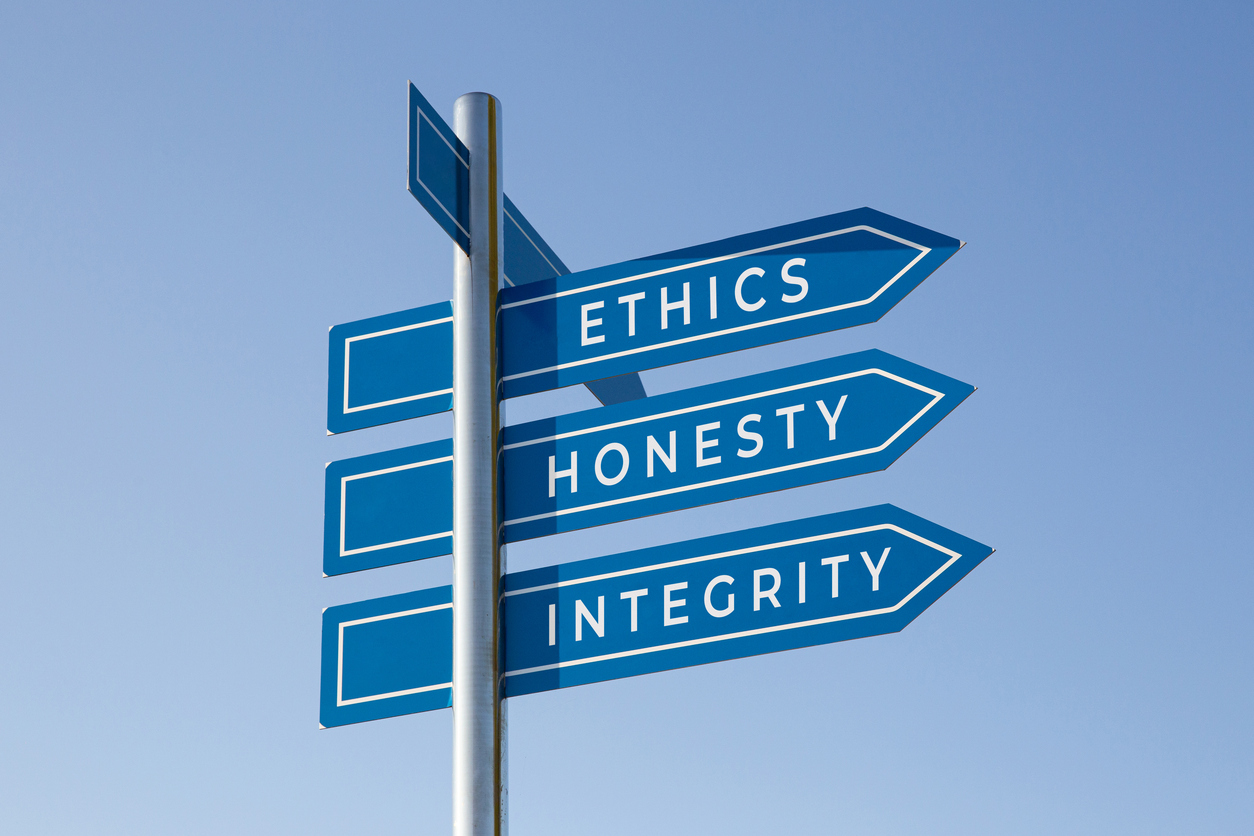
Written by
Germeen Tanas
Germeen is an aPHR-certified writer on the marketing team at BerniePortal. She writes about HR, healthcare, and benefits.
What Are Business Ethics?

According to the Ethics and Compliance Initiative’s (ECI) 2023 Global Business Ethics Survey (GBES), just over 1 in 10 employees globally say they work in a strong, ethical workplace culture. That’s a very disappointing number, especially considering that statistic was 1 in 5 in 2020. ECI also found that businesses are not taking the steps that have been proven to reduce the risk of unethical behavior significantly.
HR professionals are best positioned to institute a stronger ethical sense in their organization.
What Are Business Ethics?
You probably already know that ethics are the rules of conduct or moral principles that guide human behavior. Ethics guide many of our day-to-day decisions. But what are business ethics? And how do they impact your HR role?
According to SHRM, “The focus in business ethics is on awareness of organizational values, guidelines and codes, and behaving within those boundaries when faced with dilemmas in business or professional work.”
Broadly defined, business ethics include ethical conduct, legal compliance, and, in some cases, corporate social responsibility. They attempt to narrow the gap between personal morality and business decisions. Ethical business practices are closely related to employee perceptions of organizational justice.
What Is Organizational Justice?
HR professionals can use the term “organizational justice” to refer to the extent to which employees perceive workplace procedures, interactions, and outcomes to be fair in nature. Organizational justice can be divided into three parts:
-
Distributive justice: the fairness of the end result or outcome. For example, are employees paid equally for equal work?
-
Procedural justice: the fairness of the process. For example, are your hiring processes fair?
-
Interactional (or interpersonal) justice: how employees are treated. Are they treated with dignity or abuse?
HR leaders are ethically responsible for acting with fairness, impartiality, and equity. They also have the corporate social responsibility to make choices that will contribute to the well-being and interests of society, the organization, and its employees.
Why Should Ethics Matter to HR?
Ethics should matter to you as an HR leader because you carry the unique responsibility of modeling the ethical behavior required of staff members. As an HR pro, you have little control over what people do outside the workplace. However, you can impact much of what people do in the workplace and influence employees’ ethics over time. As Karen Young, president of HR Solutions, states, “HR should be the conscience of an organization.”
While there’s certainly some overlap, HR ethical concerns can generally be categorized in 3 different ways:
-
Anti-discrimination/Anti-harassment
-
Employment
-
Workplace Safety and Security
BernieU, our online learning platform, will debut a course on HR Ethics this June! It explores these three major HR concerns and covers how to write a Code of Ethics, the difference between law and ethics, and more!
Upon completion of the free course, you’ll receive SHRM and HRCI Continuing Education Credits. This course will also fulfill HRCI’s ethics certification requirement for HR professionals.
Additional Resources
You can stay informed, educated, and up to date with important HR topics using BerniePortal’s comprehensive resources:
- BernieU—free online HR courses, approved for SHRM and HRCI recertification credit
- BerniePortal Blog—a one-stop shop for HR industry news
- HR Glossary—featuring the most common HR terms, acronyms, and compliance
- Resource Library—essential guides covering a comprehensive list of HR topics
- HR Party of One—our popular YouTube series and podcast, covering emerging HR trends and enduring HR topics
- Community—the HR Party of One Community forum, a place devoted to HR professionals to ask questions, learn more, and help others

Written by
Germeen Tanas
Germeen is an aPHR-certified writer on the marketing team at BerniePortal. She writes about HR, healthcare, and benefits.
Related Posts
Part-time work is becoming increasingly common in today’s workforce—especially for...
As you know, healthcare and benefits can be complicated, which can make the enrollment...
With the deadline for filing and distributing 1095-C forms approaching, staying...
A strong paid time off (PTO) policy helps retain current talent and attract prospective...








Submit a Comment